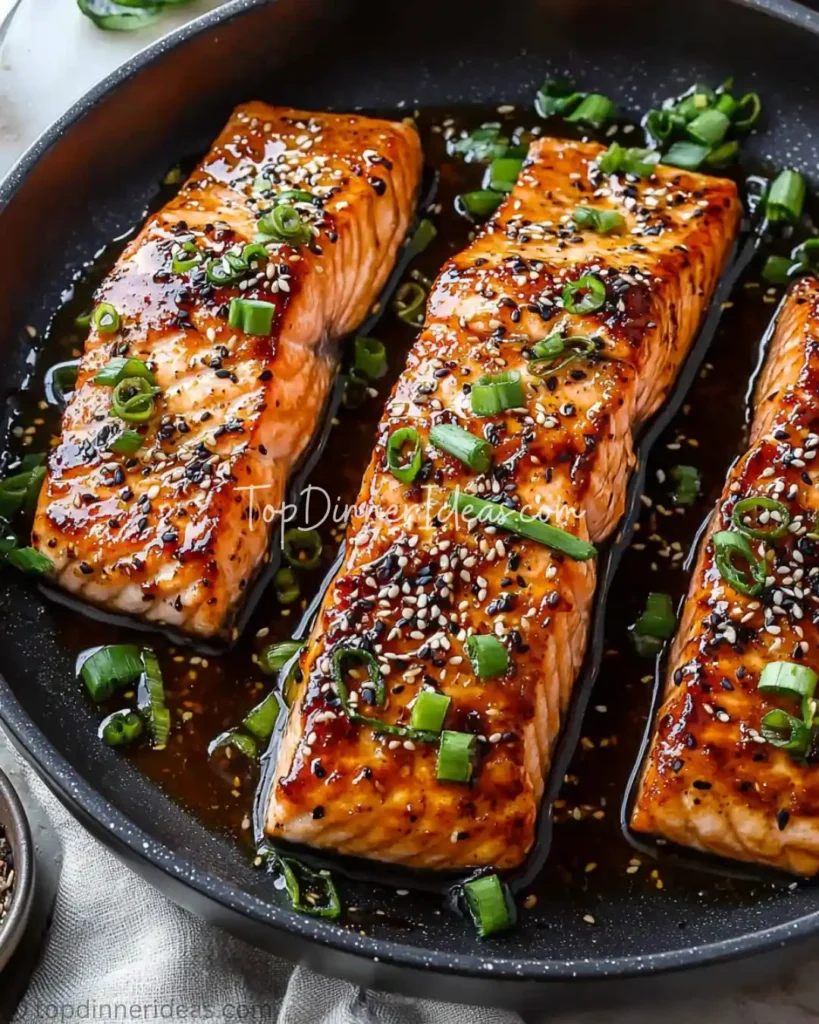Our Miso Glazed Salmon stands out as the best miso salmon recipe due to its balanced combination of sweet and salty flavors, achieved through a perfectly crafted homemade fajita seasoning and a luscious miso sauce for salmon. This recipe is versatile, allowing you to choose between baking or grilling, ensuring a meal that’s both satisfying and adaptable to your cooking preferences.
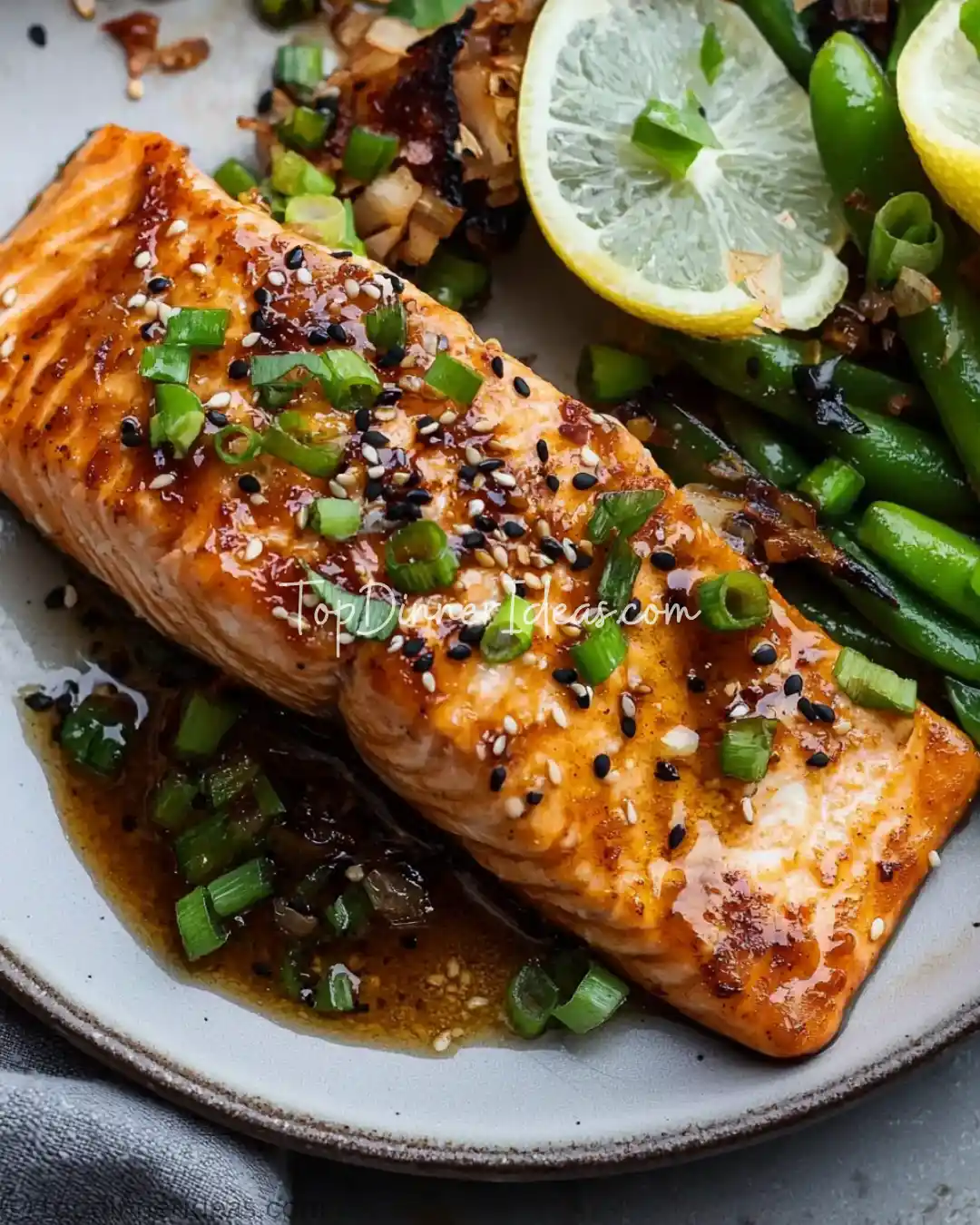
I fondly remember the first time I tried grilled salmon with miso. The smoky grill flavors enhanced the depth of the miso glaze, creating a harmonious blend that was both simple and elegant. Since then, baked miso glazed salmon has become a staple in my kitchen, cherished for its ease and delectable taste.
Equipments
Having the right equipment can make preparing Miso Glazed Salmon seamless and enjoyable. Here are the essentials you’ll need:
- Oven or Grill: Depending on your chosen cooking method, ensure you have access to an oven for baking or a grill for grilling the salmon.
- Mixing Bowls: For preparing the chicken fajita marinade and combining ingredients.
- Whisk: To mix the miso glaze thoroughly.
- Brush: For applying the glaze evenly over the salmon.
- Baking Sheet: If baking, a lined baking sheet ensures easy cleanup and even cooking.
- Meat Thermometer: To ensure the salmon reaches the perfect internal temperature.
- Knife and Cutting Board: For handling and preparing the salmon steaks.
- Aluminum Foil or Parchment Paper: To line the baking sheet for non-stick cooking.
With these tools at your disposal, preparing this miso glazed salmon recipe becomes a straightforward and enjoyable process, ensuring a delicious meal without any hassle.
Ingredients
Feel free to adjust the ingredients based on your preferences and what you have available in your kitchen. Here’s what you’ll need for our Miso Glazed Salmon:
For the Miso Sauce:
1/4 cup white miso paste
2 tablespoons soy sauce
2 tablespoons honey (or maple syrup for a vegan option)
1 tablespoon rice vinegar
1 tablespoon sesame oil
2 cloves garlic, minced
1 teaspoon grated fresh ginger
For the Salmon:
4 salmon steaks (6 oz each), skin removed
1 tablespoon olive oil
Salt and pepper to taste
Optional: 1 tablespoon sesame seeds for garnish
Optional: Sliced green onions for garnish
Topping Ingredients:
2 tablespoons olive oil
Juice of 1 lime
1 teaspoon chili powder
1/2 teaspoon cumin
1/2 teaspoon smoked paprika
Salt and pepper to taste
Instructions
Creating delicious Miso Glazed Salmon is simple and allows you to enjoy a flavorful meal with minimal effort. Follow these steps to craft a mouthwatering and satisfying dish:
Prepare the Salmon: If you choose to marinate the salmon, combine olive oil, lime juice, chili powder, cumin, smoked paprika, salt, and pepper in a bowl. Add the salmon steaks, ensuring each piece is well-coated. Marinate for at least 15 minutes or up to 2 hours in the refrigerator for deeper flavor.
Make the Miso Sauce: In a mixing bowl, whisk together white miso paste, soy sauce, honey, rice vinegar, sesame oil, minced garlic, and grated ginger until smooth and well combined. This miso sauce for salmon will provide the rich, savory glaze that makes this dish exceptional.
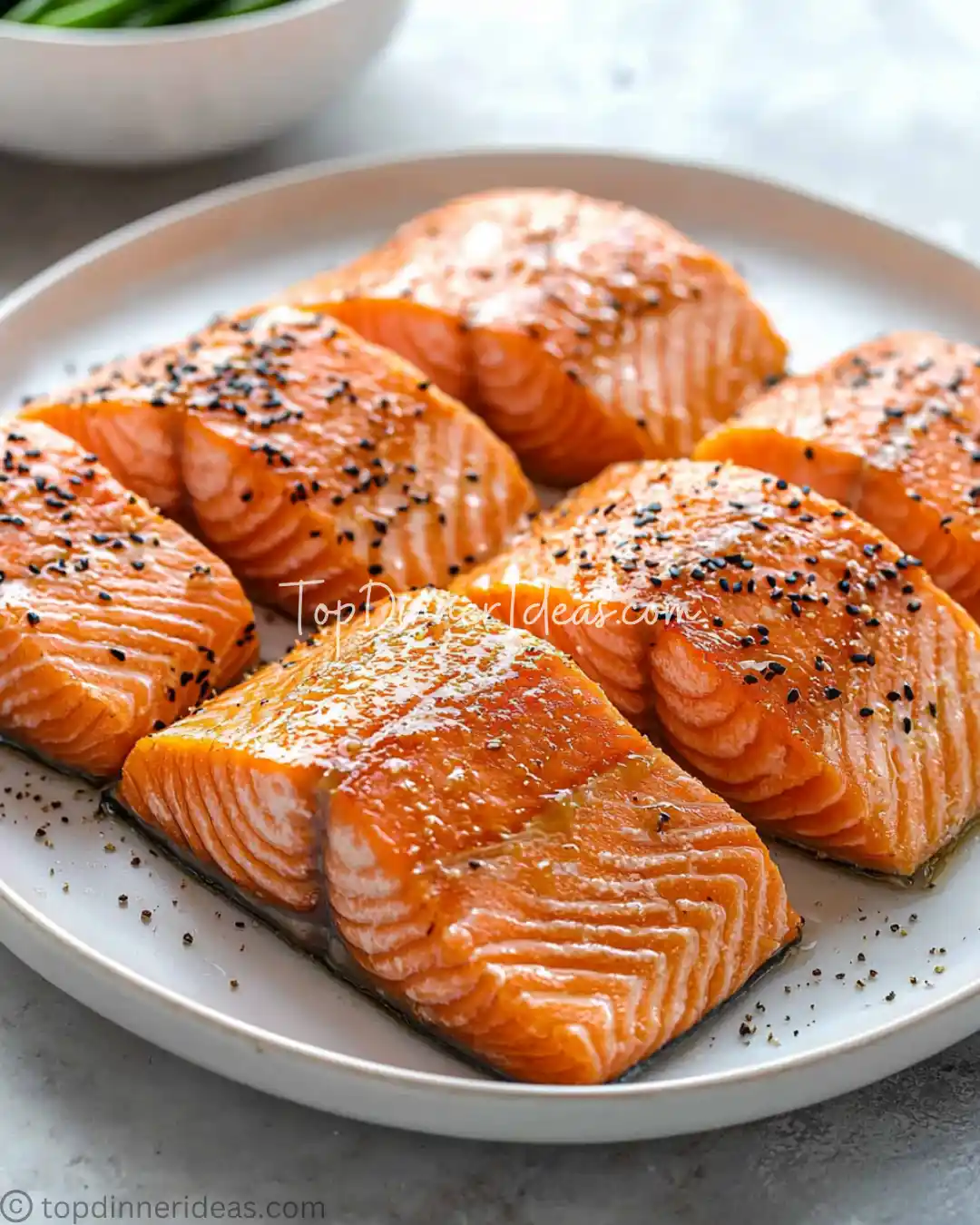
Preheat Your Cooking Method:
For Baking:Preheat your oven to 400°F (200°C). Line a baking sheet with aluminum foil or parchment paper for easy cleanup.
For Grilling:Preheat your grill to medium-high heat and oil the grates to prevent sticking.
Season the Salmon: Pat the salmon steaks dry with paper towels to ensure the glaze adheres properly. Season both sides with a pinch of salt and pepper.
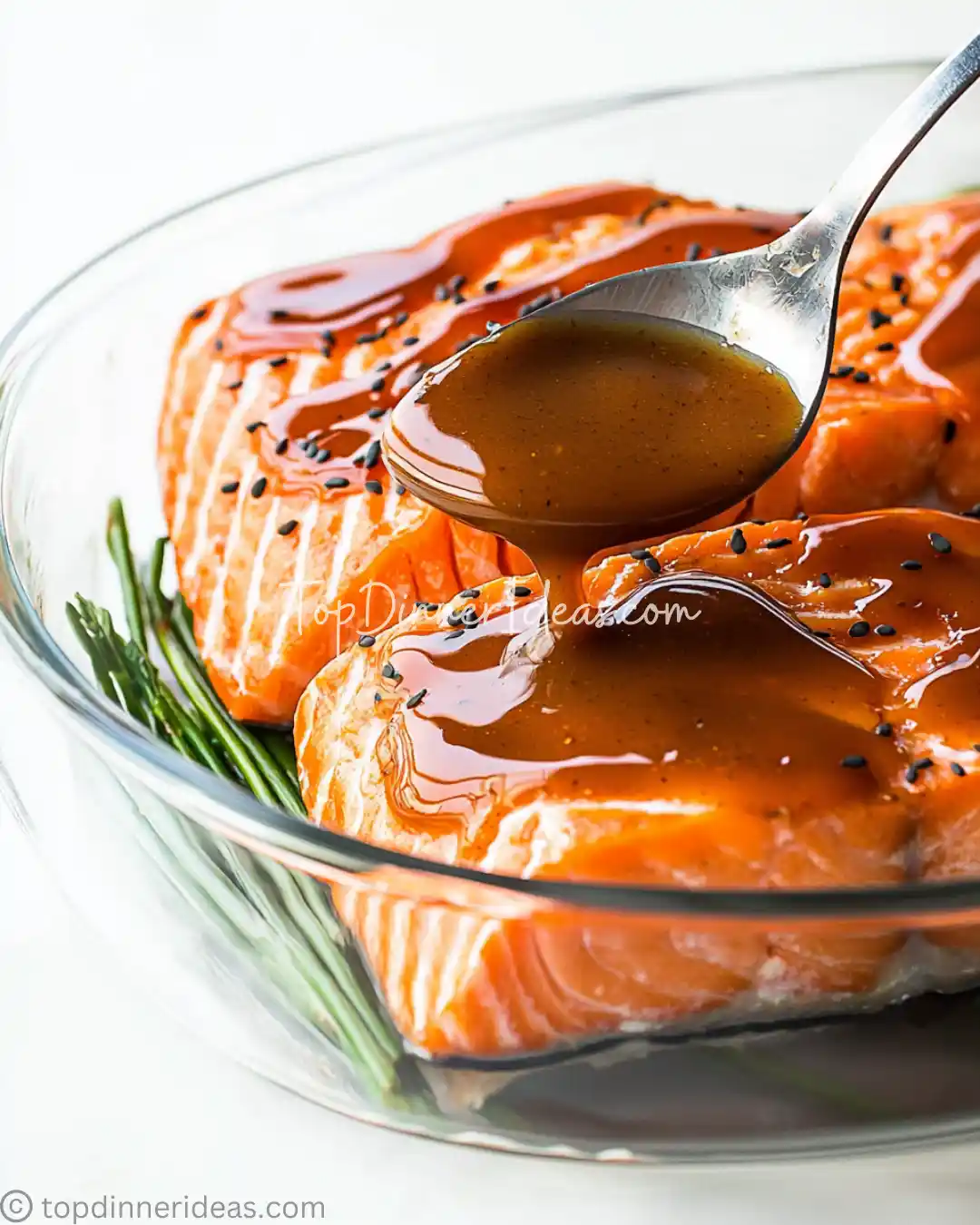
Apply the Miso Glaze: Using a brush, generously apply the miso sauce over the top of each salmon steak. Ensure an even coating for consistent flavor throughout.
Cook the Salmon:
Baked Miso Glazed Salmon:Place the glazed salmon steaks on the prepared baking sheet. Bake in the preheated oven for 12-15 minutes, or until the salmon flakes easily with a fork and reaches an internal temperature of 145°F (63°C).
Grilled Salmon with Miso:Place the glazed salmon steaks on the preheated grill. Cook for 6-8 minutes per side, or until the salmon is opaque and flakes easily with a fork.
Optional Toppings: For added texture and flavor, sprinkle sesame seeds and sliced green onions over the cooked salmon.
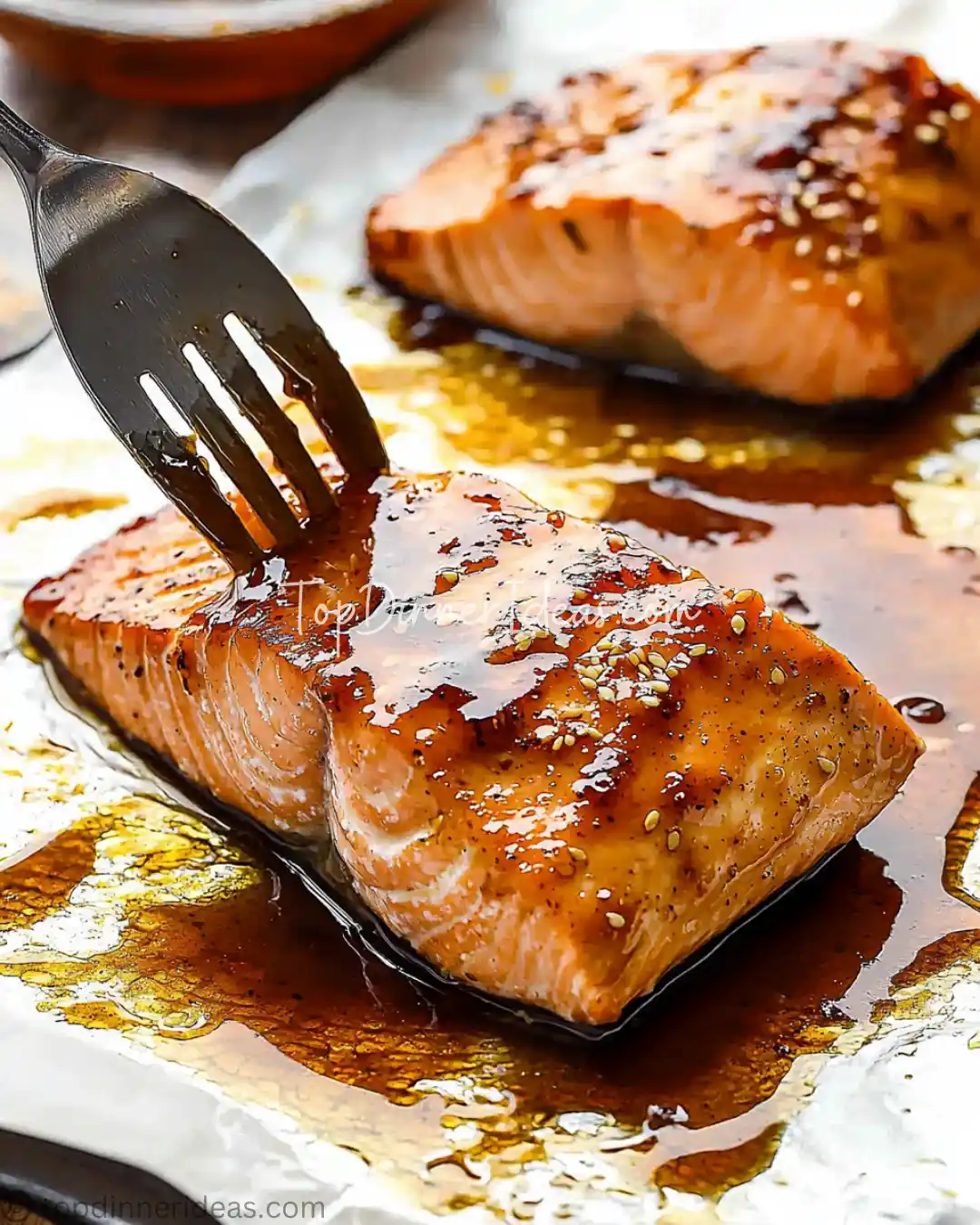
Serve: Serve the miso glazed salmon hot, paired with your favorite sides such as steamed rice, quinoa, sautéed vegetables, or a fresh green salad.
Enjoy your homemade Miso Glazed Salmon with a side of roasted vegetables or a light salad for a balanced and satisfying meal.
Allergen Information
When preparing Miso Glazed Salmon, it’s important to be mindful of potential allergens to ensure everyone can enjoy the meal safely. Here’s what you need to know:
- Contains: Soy (soy sauce, miso paste), Gluten (if using regular soy sauce), and Fish (salmon).
- Possible Cross-Contamination: Ensure that all utensils and surfaces are thoroughly cleaned if you have severe allergies, especially if preparing other dishes that contain common allergens like nuts or dairy.
Understanding these allergen details helps you make informed choices and adjustments, ensuring a safe and enjoyable dining experience for everyone.
Knowing this information allows you to accommodate dietary restrictions and prevent allergic reactions, making your cooking inclusive and considerate.
Substitutions
Adapting the Miso Glazed Salmon recipe to suit different dietary needs is easy and ensures everyone can enjoy this delicious dish. Here are some versatile substitution options:
- Gluten-Free Option: Use gluten-free soy sauce or tamari to replace regular soy sauce. Ensure that all other ingredients, like miso paste, are also gluten-free.
- Dairy-Free Option: This recipe is naturally dairy-free. If you prefer a creamier sauce, substitute sesame oil with a dairy-free alternative.
- Vegetarian/Vegan Option: Replace salmon with firm tofu or tempeh. Use plant-based miso paste and maple syrup to maintain the savory-sweet balance.
- Keto Option: Ensure the honey or maple syrup is sugar-free by using keto-friendly sweeteners like erythritol or stevia.
These substitutions make it simple to tailor the dish to various dietary preferences without compromising on taste.
Knowing these substitution options allows you to customize the recipe according to individual dietary needs, ensuring everyone can partake in the deliciousness of Miso Glazed Salmon.
Variations
Once you’ve mastered the basic Miso Glazed Salmon recipe, there are numerous ways to personalize and enhance it. Here are some creative ideas to inspire your culinary adventures:
- Honey Miso Glazed Salmon: Add a tablespoon of honey to the miso sauce for a sweeter glaze that caramelizes beautifully during baking or grilling.
- Maple Miso Glazed Salmon: Substitute honey with maple syrup to infuse a rich, smoky sweetness into the glaze.
- Grilled Salmon with Miso: Incorporate the miso glaze into your grilling routine for a smoky and savory flavor profile that pairs perfectly with charred vegetables.
- Baked Miso Salmon Recipe with Vegetables: Add sliced bell peppers, onions, and zucchini to the baking sheet alongside the salmon for a complete one-pan meal.
- Miso Fish Glaze: Enhance the miso sauce with additional flavors like mirin, sake, or a splash of orange juice for a more complex glaze.
- Marinated Miso Salmon: Let the salmon marinate overnight in the miso sauce to intensify the flavors and ensure maximum tenderness.
- Miso Glazed Salmon Steaks: Use thick-cut salmon steaks for a more substantial and impressive presentation.
- Sesame Miso Glazed Salmon: Add toasted sesame oil and sesame seeds to the glaze for an extra layer of nutty flavor.
- Spicy Miso Glazed Salmon: Incorporate sriracha or red pepper flakes into the miso glaze for a fiery kick.
- Citrus Miso Glazed Salmon: Add orange or grapefruit zest to the miso sauce for a bright and tangy twist.
Ingredient Replacements:
- Salmon: Substitute with other fatty fish like mackerel, trout, or swordfish for varied flavors.
- Honey: Use agave nectar or maple syrup as an alternative sweetener.
- Lime Juice: Replace with lemon juice for a slightly different citrus note.
- Sesame Seeds: Swap with poppy seeds or omit for those with sesame allergies.
These variations encourage creativity and allow you to adapt the recipe to suit your personal taste preferences and special occasions.
Knowing these variations helps you keep the Miso Glazed Salmon exciting and versatile, allowing you to explore different flavor profiles and presentation styles.
Notes
Enhance and customize your Miso Glazed Salmon with these helpful tips:
- Homemade Fajita Seasoning: While this recipe uses a specific seasoning blend for the marinade, feel free to create your own homemade fajita seasoning by combining spices like chili powder, cumin, paprika, garlic powder, onion powder, cayenne pepper, salt, and pepper.
- Marinate Longer for More Flavor: For deeper flavor penetration, marinate the salmon for up to 2 hours in the refrigerator. Avoid marinating for more than 4 hours to prevent the fish from becoming mushy.
- Use High-Quality Salmon: Opt for wild-caught salmon for a richer flavor and better texture. Ensure the salmon steaks are fresh and have a vibrant color.
- Pat Dry Before Cooking: Always pat the salmon dry before applying the glaze to ensure the sauce adheres properly and to promote a crispy exterior.
- Customize Your Glaze: Adjust the sweetness and saltiness of the miso glaze by varying the amount of honey or soy sauce to suit your taste preferences.
- Garnish with Fresh Herbs: Sprinkle freshly chopped parsley, cilantro, or green onions over the cooked salmon for added freshness and color.
- Serve Immediately: Miso glazed salmon is best enjoyed fresh and hot. Serve immediately after cooking to maintain the optimal texture and flavor.
- Leftover Storage: Store any leftovers in an airtight container in the refrigerator for up to 2 days. Reheat gently in the oven to preserve the texture of the glaze.
- Pair with Complementary Sides: Enhance the meal by serving with sides like steamed vegetables, rice pilaf, or a quinoa salad to create a balanced and nutritious plate.
- Experiment with Cooking Methods: Try different cooking methods such as broiling for a caramelized top or poaching for a moist and tender texture.
These tips help you achieve the best results and make the cooking process smoother and more enjoyable.
Knowing these additional tips allows you to refine your cooking technique and customize the dish to better suit your preferences and needs.
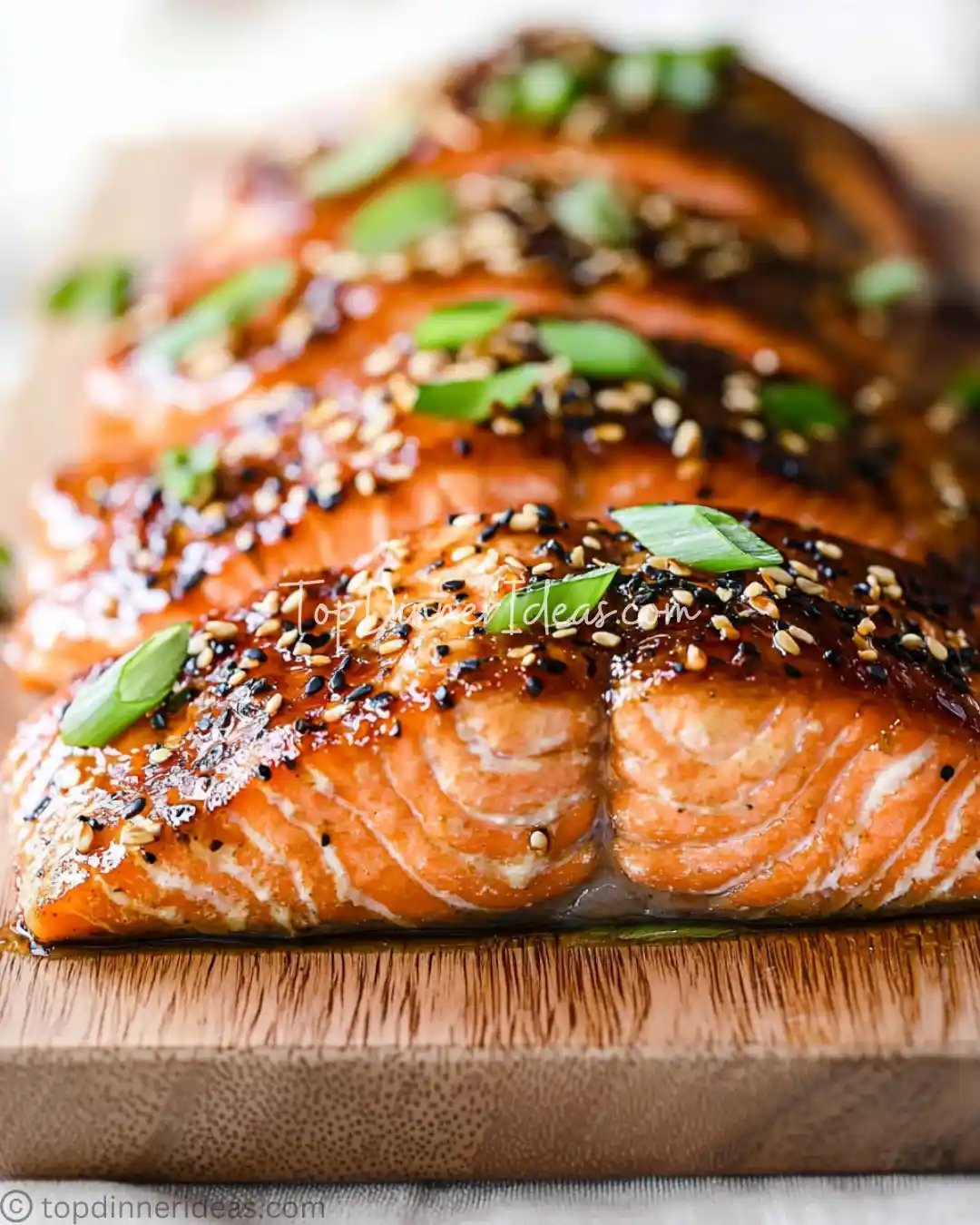
Health Benefits
Indulging in our Miso Glazed Salmon is not only a treat for your taste buds but also offers several health benefits. Here’s how the key ingredients contribute to your well-being:
Salmon:
- High in Omega-3 Fatty Acids: Supports heart health, reduces inflammation, and promotes brain function.
- Rich in Protein: Essential for muscle growth and repair.
- Vitamins D and B12: Important for bone health and energy metabolism.
Miso Paste:
- Probiotics: Supports gut health and digestion.
- Antioxidants: Protects cells from damage caused by free radicals.
Olive Oil:
- Healthy Monounsaturated Fats: Promotes heart health by reducing bad cholesterol levels.
- Antioxidants: Provides anti-inflammatory benefits.
Garlic and Ginger:
- Immune Boosters: Enhance the immune system’s ability to fight off infections.
- Anti-Inflammatory Properties: Help reduce inflammation in the body.
Bell Peppers and Onions:
- Vitamins A and C: Boost the immune system and promote healthy skin.
- Fiber: Aids in digestion and maintains bowel health.
Honey or Maple Syrup (if used):
- Natural Sweeteners: Provide a healthier alternative to refined sugars.
- Antioxidants: Contain compounds that protect against oxidative stress.
Enjoying this dish as part of a balanced diet can contribute to overall health and well-being. Remember to savor it in moderation to maintain a healthy lifestyle.
Knowing the health benefits of the ingredients allows you to make informed choices about your diet and appreciate the nutritional value of your meals.
Nutrition Facts
Understanding the nutritional content of Miso Glazed Salmon can help you make informed dietary choices. Here’s a breakdown per serving:
- Calories: 450 kcal
- Protein: 35g
- Fat: 25g
- Saturated Fat: 5g
- Carbohydrates: 10g
- Sugar: 5g
- Fiber: 1g
- Sodium: 800mg
This nutritional profile makes the Miso Glazed Salmon a protein-rich meal option, providing a substantial amount of protein to support muscle growth and repair while keeping carbohydrates relatively low. The fat content is balanced with healthy fats from olive oil and salmon, though it’s important to enjoy in moderation due to the saturated fat and sodium levels.
Knowing the nutritional information helps you incorporate this dish into your dietary plan, ensuring it aligns with your nutritional goals.
Nutritional values can vary based on specific ingredient brands and measurements used. For more precise information, refer to the labels of your chosen ingredients.
Cooking Tips
Mastering the art of cooking Miso Glazed Salmon is easier with a few expert tips:
- Use Fresh Ingredients: Fresh salmon and high-quality miso paste make a significant difference in flavor and texture.
- Pat the Salmon Dry: Before applying the glaze, pat the salmon dry to ensure the sauce adheres properly and promotes a nice glaze formation.
- Preheat the Oven or Grill: Ensure your cooking surface is properly preheated to achieve even cooking and prevent sticking.
- Monitor Cooking Time: Salmon cooks quickly. Keep an eye on it to prevent overcooking, which can lead to dry fish.
- Apply the Glaze Evenly: Use a brush to spread the miso glaze uniformly over the salmon to ensure consistent flavor in every bite.
- Baste During Cooking: For extra flavor, baste the salmon with additional glaze halfway through the cooking process.
- Let It Rest: Allow the salmon to rest for a few minutes after cooking to let the juices redistribute, ensuring moist and tender flesh.
- Experiment with Flavors: Feel free to add other flavors to the glaze, such as orange zest for a citrus twist or a splash of sake for added depth.
- Serve Immediately: Miso glazed salmon is best enjoyed fresh and hot. Serve immediately after cooking to maintain the optimal texture and flavor.
- Pair with Complementary Sides: Enhance the meal by serving with sides like steamed vegetables, rice pilaf, or a fresh green salad for a balanced and nutritious plate.
These techniques will help you achieve perfectly cooked, flavorful Miso Glazed Salmon every time.
Knowing these cooking tips ensures you can consistently produce delicious and well-prepared meals, enhancing your overall cooking experience.
Storage Advice
Properly storing Miso Glazed Salmon ensures it stays fresh and delicious for future meals. Here’s how to do it:
- Refrigeration: Store leftover miso glazed salmon in an airtight container in the refrigerator for up to 2 days. To maintain the glaze’s integrity, keep it separate from any sauces or sides.
- Freezing: For longer storage, place the salmon in a freezer-safe container or resealable freezer bag. Freeze for up to 3 months. Thaw overnight in the refrigerator before reheating.
- Reheating: Reheat the salmon gently in the oven at 350°F (175°C) for about 10 minutes to restore its original texture. Avoid microwaving, as it can make the glaze soggy.
- Preventing Sogginess: If storing with tortillas, reheat them separately just before serving to maintain their texture. Store any additional toppings in separate containers.
- Labeling: Clearly label containers with the date to keep track of freshness and ensure timely consumption.
- Leftover Reuse: Transform leftover miso glazed salmon into other dishes such as salads, sandwiches, or rice bowls for added variety.
By following these storage guidelines, you can enjoy your Miso Glazed Salmon safely and conveniently at a later time.
Knowing how to properly store your dishes helps minimize food waste and ensures you always have a delicious meal ready when needed.
Serving Suggestions
Presenting Miso Glazed Salmon in creative ways can elevate your dining experience. Here are some ideas to inspire your presentations:
- With Steamed Rice: Serve the salmon over a bed of fluffy steamed rice, drizzled with any remaining miso glaze.
- Accompanied by Stir-Fried Vegetables: Pair with a colorful mix of stir-fried vegetables like bell peppers, snap peas, and carrots for a balanced meal.
- In a Rice Bowl: Create a hearty rice bowl with miso glazed salmon, avocado slices, cucumber, and a sprinkle of sesame seeds.
- With a Fresh Green Salad: Complement the rich flavors of the salmon with a crisp green salad dressed in a light vinaigrette.
- On Top of Noodles: Place the salmon over a serving of soba or udon noodles tossed in a soy-based sauce.
- With Pickled Vegetables: Add a side of pickled ginger or radishes to provide a tangy contrast to the savory salmon.
- In Lettuce Wraps: Use large lettuce leaves as wraps for the salmon and vegetables for a low-carb option.
- With a Citrus Glaze: Add a fresh squeeze of lemon or lime juice over the salmon for an extra burst of flavor.
- With a Side of Quinoa: Serve alongside quinoa mixed with herbs and vegetables for a nutritious and filling meal.
- As Part of a Bento Box: Include the miso glazed salmon in a bento box with rice, vegetables, and a small portion of pickles for a complete and visually appealing meal.
These serving ideas not only enhance the presentation but also provide a balanced and satisfying meal.
Knowing these serving suggestions allows you to diversify your meals and present your dishes in an appealing and appetizing manner.
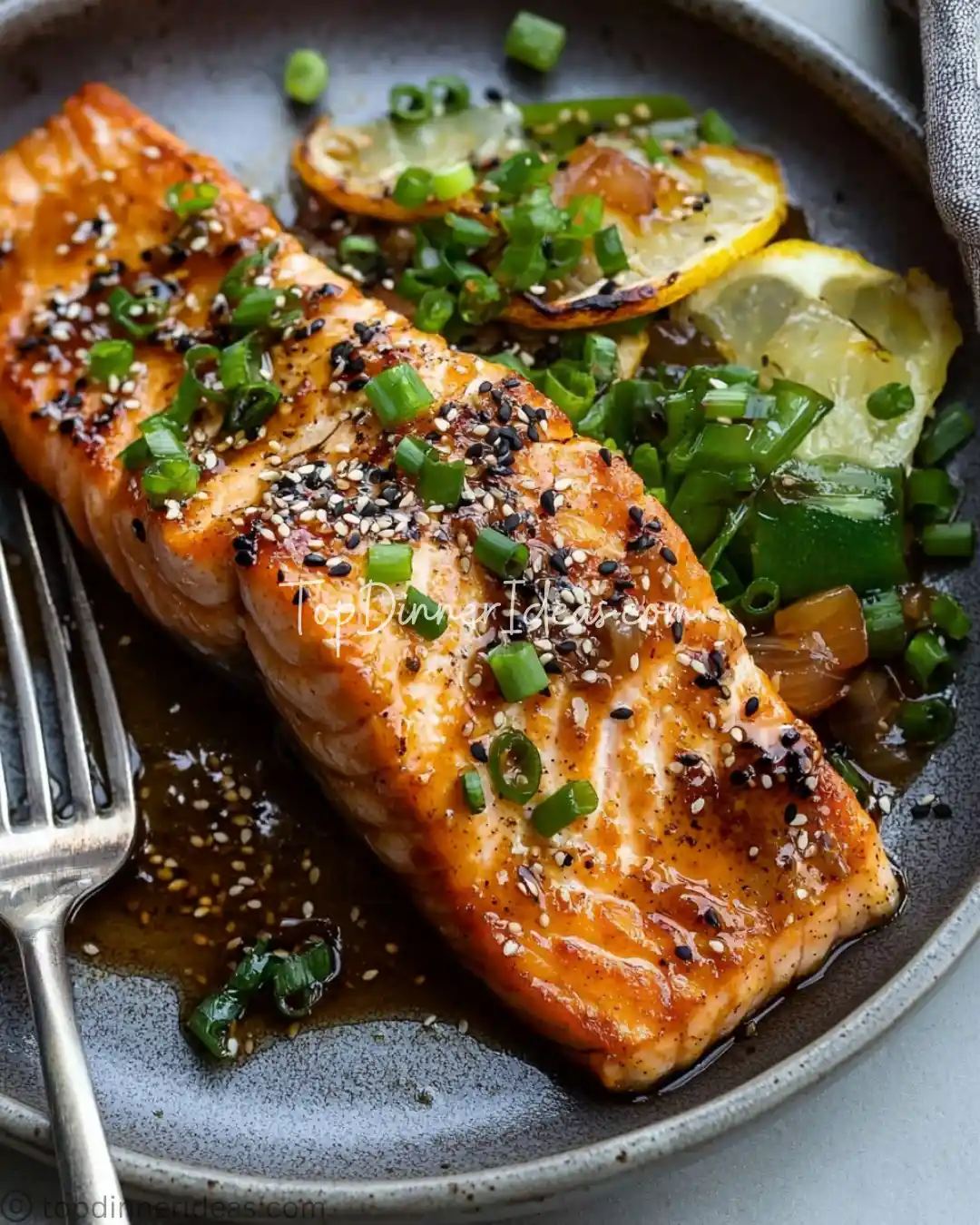
Troubleshooting
Encountering issues while preparing Miso Glazed Salmon? Here are common problems and their solutions to ensure your dish turns out perfectly:
- Salmon Overcooked and Dry: Use a meat thermometer to check for an internal temperature of 145°F (63°C). Remove the salmon from the oven or grill as soon as it reaches this temperature to prevent overcooking.
- Miso Glaze Not Adhering Properly: Ensure the salmon is patted dry before applying the glaze. Applying a thin layer of oil can help the glaze stick better. Alternatively, marinating the salmon can enhance the glaze’s adhesion.
- Glaze Too Salty: Adjust the amount of soy sauce in the miso sauce or opt for a low-sodium soy sauce. Balance the flavors with additional sweeteners like honey or maple syrup if necessary.
- Glaze Too Sweet: Reduce the amount of honey or maple syrup in the miso glaze. Add a splash of rice vinegar or lime juice to balance the sweetness with acidity.
- Salmon Sticking to the Baking Sheet or Grill: Line the baking sheet with aluminum foil or parchment paper and lightly grease it with oil. For grilling, ensure the grates are well-oiled and preheated to prevent sticking.
- Glaze Burns Before Salmon is Cooked: Apply the glaze towards the end of the cooking process, such as the last 5-10 minutes of baking or grilling, to prevent it from burning while the salmon cooks through.
- Lack of Flavor: Increase the amount of garlic, ginger, or lime juice in the marinade for enhanced flavor. Incorporate fresh herbs like cilantro or green onions as garnishes to add freshness.
- Uneven Cooking: Arrange the salmon steaks in a single layer with space between them to ensure even heat distribution. Rotate the baking sheet or turn the salmon halfway through cooking for uniform results.
These solutions will help you overcome common hurdles and achieve a delicious Miso Glazed Salmon every time.
Knowing how to troubleshoot common issues ensures you can consistently produce high-quality dishes, enhancing your cooking confidence and skills.
FAQ
Miso glazed salmon pairs wonderfully with sides like steamed rice, quinoa, roasted vegetables, sautéed greens, or a fresh cucumber salad. Adding a citrusy vinaigrette or a dollop of wasabi mayo can also enhance the meal.
Complement your miso glazed salmon with sides such as jasmine rice, soba noodles, roasted sweet potatoes, or a crisp green salad. Freshly steamed asparagus or broccoli florets also make excellent accompaniments.
Bake miso glazed salmon in a preheated oven at 400°F (200°C) for approximately 12-15 minutes, or until the salmon flakes easily with a fork and reaches an internal temperature of 145°F (63°C).
Serve miso glazed salmon with sides like garlic butter noodles, teriyaki vegetables, or a refreshing avocado and mango salsa. Additionally, a side of miso soup can complement the flavors beautifully.
While cheese isn’t traditionally paired with salmon, you can add a sprinkle of feta or goat cheese for a tangy contrast if desired. Alternatively, omit the cheese for a pure miso and salmon flavor experience.
Miso glazed salmon draws inspiration from traditional Japanese cuisine, where miso paste is used to marinate and flavor fish. The fusion of miso with Western cooking techniques has popularized this delicious preparation method globally.
Baking miso salmon at 350°F (175°C) typically takes about 18-20 minutes. However, cooking times can vary based on the thickness of the salmon steaks, so using a meat thermometer is recommended for precision.
Yes, you can freeze miso glazed salmon. Allow the salmon to cool completely, then wrap it tightly in plastic wrap and place it in a freezer-safe bag or container. It can be frozen for up to 2 months. Thaw overnight in the refrigerator before reheating.
it’s not recommended. While plain salmon is safe for dogs in moderation, the miso glaze contains soy and other seasonings that can be harmful to dogs. Always avoid feeding your pets seasoned or sauced human foods.
Miso glazed salmon can last in the refrigerator for up to 3 days when stored in an airtight container. For the best quality, consume within this timeframe and reheat thoroughly before serving.
Yes, this recipe doesn’t require milk. The miso glaze is made with miso paste, soy sauce, honey or maple syrup, and other flavorful ingredients, ensuring a rich and savory taste without dairy.
These answers address common concerns and help you make the most of your Miso Glazed Salmon experience.
Knowing the answers to these FAQs ensures you have the information needed to successfully prepare and enjoy this delicious dish.
Footnotes
Embarking on the journey to create Miso Glazed Salmon opens up a world of culinary possibilities. Feel free to experiment with different ingredients and techniques to make this recipe your own. Whether you’re adding a spicy kick with sriracha or incorporating fresh herbs for an aromatic touch, your personal flair will make the dish uniquely yours. Happy cooking, and enjoy the flavorful adventure of your homemade miso glazed creation!
For more delicious recipes and cooking tips, Navigate to our Main Dishes section, or visit Trustedrecipe. Thank you for choosing this recipe, and may your kitchen adventures be tasty and enjoyable!
